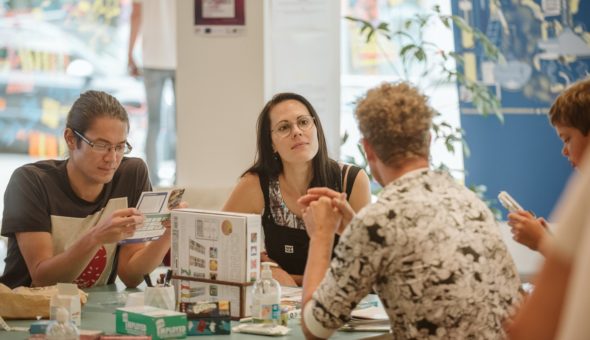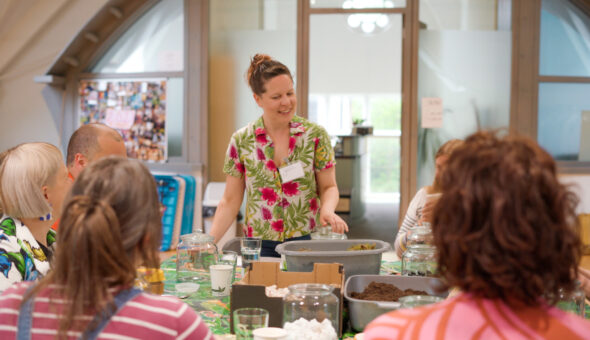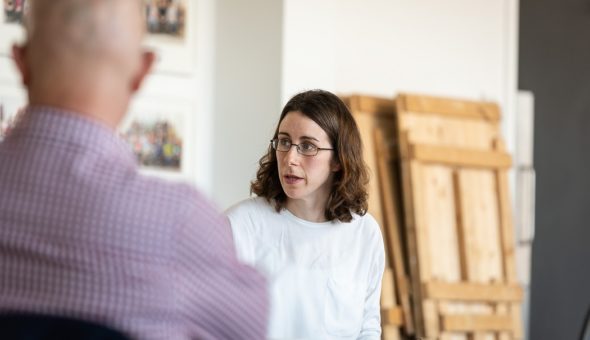Our latest funding call, the Participate Grants, launched at the end of January 2024, and while it may appear a conventional scheme, we took a bit of a radical approach to developing it.
In the summer of 2023, we outlined our rationale behind testing out participatory grant-making within a university context as part of the ParticipatoryResearch@Bath project. Taking a participatory approach to involve people outside the University in research means working across the whole research lifecycle, including funding. So, with that in mind, we decided to co-create a funding call with researchers at the University of Bath and community groups from Bath and North East Somerset.
Shifting power
Before we delve into the mechanics of the call’s development, we wanted to share some insight we gained from our experience over 2023 as part of an action learning programme, Power Shift. Through this programme, we encountered people in all sorts of organisations, including local authorities, member-led organisations, and charities and explored governance and the transformational role it could play in creating change for a more fair and just society. We've taken away some key learnings that have informed our approach:
Proportionality – being truly participatory can feel like you have to involve everyone, everywhere, all at once. We reflected that over-engaging can waste resources (are we spending more on the process of creating a call than on the money we’ll be distributing through the call?) and not suit everyone’s approach to contributing (some people will just want to know that a due process has been followed rather than be part of the process).
Governance – while we were initially concerned about governance for the call, we realised we needed governance around ourselves. This allowed us to let people know of our plans and influence them. Of course, this is good practice in and of itself, but it also afforded us a level of protection should things not go quite according to plan or should people react badly when the call comes out.
Care – we often talk about doing no harm through our work and in the work we support, but should we not all feel better from what we do? How can we be more caring in what we do?
Reciprocity – being relational in our work and in the work we support so that we step away from the conventional transaction of time for money. We were lucky to hear first-hand from Dark Matter Labs about their approach and closer to home in a research context how the National Institute for Health Research recognise that being involved with research is not “work”.
Reflective – we’ve always taken a reflective approach to our work and are strong proponents of piloting work to learn before we scale it up or embed it into our everyday practice. We took a new phrase from the Power Shift “good enough to progress, safe enough to try” which we think helps bring others along with potentially radical ideas.
Getting permission
With these learnings in mind, we sent a paper to the University’s Research Culture Working Group that outlined our proposed approach to developing the funding call.
There was general support for the proposal, with only one question about how to sustain this funding model if it was successful.
To be honest, I was a little surprised at how little discussion there was in that meeting. But on reflection, I realised that we’d laid the groundwork many months previously with our overall approach to our work, and there had been regular updates. What was potentially radical was a logical progression in our approach to the ParticipatoryResearch@Bath project. And it’s worth noting that this initiative is built on a decade of our previous work, which has only gone well.
We are a well-respected and trusted team within the University, and I think this affords us some grace for what we do and how we do it.
Co-creating the call
Of the £89,000 from the 2023/24 Participatory Research funding allocation, we wanted to allocate a sizeable chunk to this call and allocated £50,000 in total.
To develop the call itself, we ran a series of workshops with members of community organisations and academics from across the University's three Faculties and School of Management.
When we were first thinking about who to involve in this process, we kept adding more and more people with relevant expertise in an attempt to be inclusive of all viewpoints. But this rapidly became unwieldy and wasn’t proportionate (key learning from Power Shift!). So we decided to keep it as light-touch as possible. Two people from community organisations, four academics and ourselves working over three workshops.
First workshop
Taking learning from a previous project (Community Matters), we ran the first workshop twice: once with the community members and once with the academics. This ensured that one group didn’t dominate over the other – particularly where opinions or perceptions may differ.
In the first workshop, we discussed key terms: participatory, research, and funding. This was a real eye-opening exercise as there were some distinct differences between and within the groups.
Second workshop
The second workshop brought everyone together to discuss the key terms and make a first attempt to agree on definitions. A major part of the second workshop was to discuss the parameters for the funding.
Third workshop
The third workshop looked at the details of the call: goals and premises, call approach and criteria, funding levels, assessment panel, the support we would need to provide, and ethical considerations. Much of these issues had emerged from the discussions in workshop two.
The funding call is now live, and you can see what we’ve pulled together on the Participate Grants call guidance page. It’s been live for just over a week, and we’ve already had enquiries from community groups outside of the University, which is a real success for us. It’s a sign that we have produced something that doesn’t only speak to the academic community within the University, which is what we really wanted to see happen.
Reflections from the process
What have we taken from the co-creation process?
- Some people we invited didn’t understand what we were asking of them – most people only interact with funding calls by applying for them. Some may sit on the assessment panels. Creating a funding call is a real privilege not many of us get to do. Being invited to create a funding call was so far from how people normally interact with funding that it was an impossible ask. Our community members involved with the process had experience in distributing funding and using different approaches to distribution. This was a significant help as our academic members were much less familiar with different approaches to funding.
- Being proportionate worked. The small number of people involved was sufficient to have diversity and representation. Of course, when it comes to seeing how it applies and who gets funding, we’ll be able to see how the diversity plays out.
- There was a lot of difference in how we all thought about research. This was reflected in differences in how research could be conceived (a cycle with different stages or a series of unrelated projects), when it starts (at the idea stage or when the funding lands in the bank), and what “counts” as research (e.g. it can be synthesising existing knowledge into new knowledge, as well as collecting new data)
- We’ve had to relax our hard-line stance on being participatory. While the rationale for taking this approach was that we can’t fund participatory research if the funding call isn’t participatory, we are going to end up funding work that isn’t truly participatory through this call! This is because we have to accept that not everyone is ready for participatory approaches, and they may need to develop their practices from where they are now towards participation.
- We’ve really opened up what the funding can be used for – it’s OK to spend money on, for example, events for people rather than just a transaction of time for money. This is about supporting the reciprocal and relational aspects of participatory work (more Power Shift learning!).
- When we talked about assessment panels, there was a consensus that we, as the Public Engagement Unit, could do the assessment as the process had been robust.
- Risks are things we will encounter, and we have to manage them, we can’t eliminate them.
- Some of our decisions have excluded people (particularly PhD researchers) and we’ll need to explain why that is the case.
- And finally, we started by calling our process participatory, but it was pointed out that the people who would be applying for the funding weren’t in the room, so it wasn’t truly participatory. We now say that we co-created the call.
There is still a long way to go. We don’t know how many people will enquire, who they will be, if the call makes sense to people, who will get funded, what types of work will be funded, and then what will happen once people start on those pieces of work.
Being radical
I’m pleased with what we’ve got to do and am looking forward to the ideas we see coming in. But outside of that, my biggest reflection is about the nature of being radical or transformational, particularly in a large, traditional organisation. The Public Engagement Unit has been at the University of Bath since 2012, which has given us a good grounding. Our remit has always been one of change and challenging the status quo. But we are also used to operating within the constraints of our institutional and sectoral habits. I doubt we would have taken this approach, or indeed had the relatively smooth passage so far, a decade ago. There is something about understanding the conditions you are operating in and the foundations you have that can help inform just how transformational you can be (whilst also not appearing to be transformational at all!).
Helen Featherstone is Head of Public Engagement at the University of Bath.
Respond



